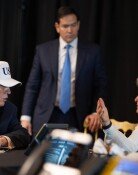[Opinion] Science and Engineering
[Opinion] Science and Engineering
Posted July. 10, 2003 21:54,
China is known to treat science and engineering majors better than any other country in the world. The nine members of the standing committee at the political bureau, a key policy-making body virtually leading the country, all majored science and engineering at college. President Hu Jintao studied math and science at Chinghwa University and former president Jiang Zemin was a machinary and electrics major at Shanghai University. Vice President Chung Chinghung studied automation at Beijing Institute of Industries, Prime Minister Wen Jiaboa studied mining at Beijing Institute of Geology and Deputy Prime Minister Wui studied petroleum and refinery at Beijing Institute of Petroleum. Two former Prime Minister Ju Ronji and Le Peng were also science and engineering majors at college. To catch up with technology-savvy Americans and Russians, the Chinese government has been seeking to foster science and technology experts since the 1950s.
The Korean government, however, has given limited chances for those who majored science and engineering when it comes to climbing up the ladder within government organizations. Of high-ranking officers working for central agencies, those from science and engineering schools account for only 24.7%. The proportion diminishes as ranks get higher. Science and engineering experts account for 24% at level 3, 18.2% at level 2 and 9.7% at level 1. It seems almost impossible for engineers to be promoted to the top level. Even engineering jobs are often assigned to administrative officers. Of 25 district offices in Seoul, 14 appointed administrative officers as head of the construction and transportation department.
Seeing the slim chances, the number of students who choose to study science and engineering is increasingly dwindling. For those who choose to do so, many apply for medical schools, thinking that is the only way to succeed. Students who apply for local medical schools are ahead of students who apply for engineering schools in Seoul in terms of scores they won. Even after they enter engineering schools, many quit temporarily to study again to become medical school students. Of those students who entered natural science and engineering colleges at Seoul National University this year, about 70 filed for a temporary absence to study again aiming at medical schools. Graduate schools of natural science and engineering at the university barely chose 53.7% and 64% of the numbers of students it planned to admit. Laboratories at Seoul National University, supposed to play a core role in development of science and engineering in this country, grow increasingly empty.
The key to the success in China lies in the fact that the government hire science and engineering majors who are both good at theories and practice. Visiting China for a summit meeting, President Roh said on July 9, ˝The government will hire those who majored science and engineering at college for key posts involved in policy-making process,˝ apparently simulated by the Chinese system. The Presidential Science and Technology Advisory Panel on July 10 that it will increase the proportion of science and engineering majors to a half of the total number of new high-ranking officers beginning 2005. It is relieving that the government takes due measures to foster science and engineering experts, albeit belatedly. The future of this country hinges on competitiveness of science and engineering.
Kim Sang-young, Editorial Writer, youngkim@donga.com







